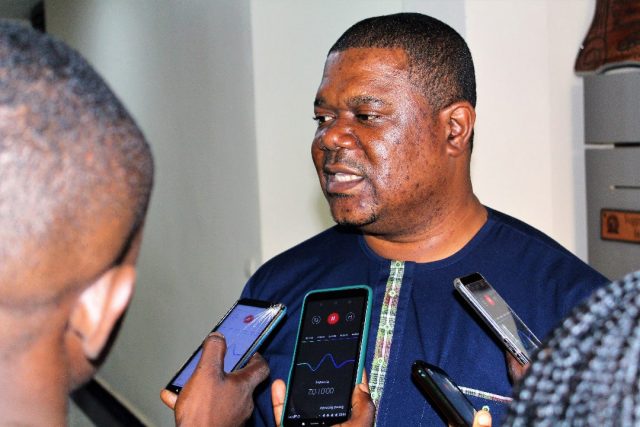
Prof Cyrille Ndo talking to the press
An expert and researcher, Prof Cyrille Ndo, Head Department of Parasitology and Microbiology at the Centre for Research in Infectious Diseases, CRID, and Deputy Country Coordinator in Cameroon of Partnership for Increasing the Impact of Vector Control, PIIVeC, project, has recommended the involvement of communities in the fight against mosquitoes. He made the recommendation while speaking to the press Friday, August 19, ahead of World Mosquito Day celebrated on August 20. This year’s World Mosquito Day was under the theme “Harness innovation to reduce the malaria disease burden and save lives”. Prof Ndo said: “I think that we need to involve the communities in fighting against mosquitoes. It shouldn’t be only about researchers as we did in the past, but we have to involve the communities and this has to be the next way in combating mosquito-borne diseases”. According to the researcher, “mosquitoes have become resistant to insecticides, and this has lowered the efficiency of the mosquito nets that are impregnated with pyrethroids only”. According to the researcher, “mosquitoes have become resistant to insecticides, and this has impacted the efficiency of the mosquito nets used in Cameroon and most of the nets used are treated with theroids only”.
Through the work done by the Centre for Research in Infectious Diseases, CRID, it has been found that these mosquito nets are no longer efficient, and we now need a combination of insecticides plus a PBO which is a synergise that blocks the actions of enzymes making it less efficient,” he said. “So, we have provided this result to the Malaria Control Programme and based on the evidence, the programme was able to choose the nets which are going to be distributed across the country in accordance with the resistance profile of mosquitoes to the insecticides. During the next distribution, we are not going to have the same type of nets in all the regions but different nets in line with the specificity of the area. This will help us overcome resistance and to reduce this burden in Cameroon,” Prof Ndo noted. Talking on strategies to fight malaria, Prof Nod noted that the use of mosquito nets is just part of the strategies to reduce the malaria burden. “Apart from the nets, we also have other strategies to reduce malaria burden. We also have to reduce the prevalence of parasitic infections in humans. How we use drugs is to reduce the presence in humans which can also help to decrease the prevalence of the disease,” he said. “CRID is also working on the parasitic aspect in trying to determine the prevalence across the country and also characterise the resistant marker to the drugs in Cameroon,” he added. He noted that to reduce the burden of diseases transmitted by mosquitoes, “we have to combat the vector because, reduce the density of the vector, and reduce the transmission of these diseases”.
World Mosquito Day, observed annually on August 20, is a commemoration of British doctor, Sir Ronald Ross’s, discovery in 1897 that female anopheline mosquitoes transmit malaria between humans. Prior to the discovery of the transmitting organism, vector, there were few means for controlling the spread of the disease although the discovery of quinine in treatment had alleviated the problem of treatment.
Page 6 The Guardian Post N0 2546, Thursday August 25, 2022, CULTURE / HEALTH / EDUCATION www.theguardianpostcameroon.com






